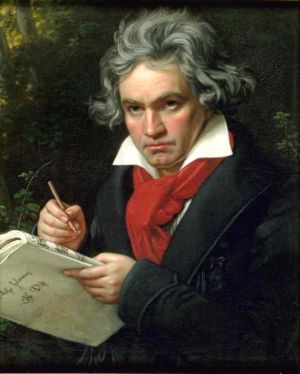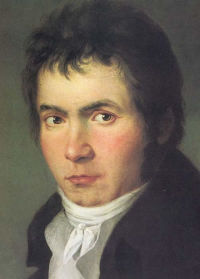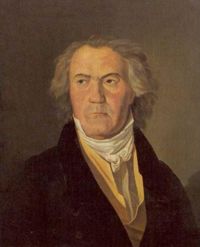Ludwig van Beethoven
2007 Schools Wikipedia Selection. Related subjects: Performers and composers
Ludwig van Beethoven ( pronounced [ˈbeː.to.vən]) ( baptised December 17, 1770 – March 26, 1827) was a German composer and pianist. He is generally regarded as one of the greatest composers in the history of music, and was the predominant figure in the transitional period between the Classical and Romantic eras in Western classical music. His reputation and genius have inspired—and in many cases intimidated—ensuing generations of composers, musicians, and audiences.
Born in Bonn, Germany, he moved to Vienna, Austria, in his early twenties, and settled there, studying with Joseph Haydn and quickly gaining a reputation as a virtuoso pianist. In his late twenties he began to lose his hearing, and yet continued to produce notable masterpieces throughout his life in the face of this personal disaster. Beethoven was one of the first composers who worked as a freelance — arranging subscription concerts, selling his compositions to publishers, and gaining financial support from a number of wealthy patrons — rather than being permanently employed by the Church or by an aristocratic court.
Life
Beethoven was born at Bonngasse 515 (today Bonngasse 20) in Bonn, Germany to Johann van Beethoven ( 1740– 1792) and Magdalena Keverich van Beethoven ( 1744– 1787). Beethoven was baptized on December 17, but his family and later teacher Johann Albrechtsberger celebrated his birthday on December 16.
Beethoven's first music teacher was his father, a musician in the Electoral court at Bonn who was apparently a harsh and unpredictable instructor. Johann would often come home from a bar in the middle of the night and pull young Ludwig out of bed to play for him and his friend. Beethoven's talent was recognized at a very early age. His first important teacher was Christian Gottlob Neefe. In 1787 young Beethoven traveled to Vienna for the first time, where he may have met and played for Mozart. He was forced to return home because his mother was dying of tuberculosis. Beethoven's mother died when he was 18, shortly followed by his sister, and for several years he was responsible for raising his two younger brothers because of his father's worsening alcoholism.
Beethoven moved to Vienna in 1792, where he studied for a time with Joseph Haydn in lieu of Wolfgang Amadeus Mozart, who had died the previous year. He received additional instruction from Johann Georg Albrechtsberger (Vienna's preeminent counterpoint instructor) and Antonio Salieri. Beethoven immediately established a reputation as a piano virtuoso. His first works with opus numbers, the three piano trios, appeared in 1795. He settled into the career pattern he would follow for the remainder of his life: rather than working for the church or a noble court (as most composers before him had done), he supported himself through a combination of annual stipends or single gifts from members of the aristocracy, income from subscription concerts, concerts, and lessons, and sales of his works.
Loss of hearing
Around 1801, Beethoven began to lose his hearing. He suffered a severe form of tinnitus, a "roar" in his ears that made it hard for him to appreciate music; he would avoid conversation. The cause of Beethoven's deafness is unknown, but it has variously been attributed to syphilis, lead poisoning, typhus, and even his habit of immersing his head in cold water to stay awake. The oldest explanation, from the autopsy of the time, is that he had a "distended inner ear" which developed lesions over time.
Russell Martin has shown from analysis done on a sample of Beethoven's hair that there were alarmingly high levels of lead in Beethoven's system. High concentrations of lead can lead to bizarre and erratic behaviour, including rages. Another symptom of lead poisoning is deafness. In Beethoven's time, lead was used widely without an understanding of the damage it could lead to: for sweetening wine, in finishes on porcelain, and even in medicines. The investigation of this link was detailed in the book, Beethoven's Hair: An Extraordinary Historical Odyssey and a Scientific Mystery Solved. However, while the likelihood of lead poisoning is very high, the deafness associated with it seldom takes the form that Beethoven exhibited.
Over time, his hearing loss became acute: There is a well-attested story that, at the premiere of his Ninth Symphony, he had to be turned round to see the tumultuous applause of the audience; hearing nothing, he began to weep. In 1802, he became depressed, and considered committing suicide. He left Vienna for a time for the small Austrian town of Heiligenstadt (see the 1802 Heiligenstadt Testament), where he resolved to continue living through his art. Beethoven's hearing loss did not affect his ability to compose music, but it made concerts — lucrative sources of income — increasingly difficult. After a failed attempt in 1811 to perform his own Piano Concerto No. 5 "Emperor," he never performed in public again.
As a result of Beethoven's hearing loss, a unique historical record has been preserved: he kept conversation books discussing music and other issues, and giving an insight into his thought. Even today, the conversation books form the basis for investigation into how he felt his music should be performed, and his relationship to art - which he took very seriously.
Social difficulties
Beethoven's personal life was troubled. Around age 28, he started to become deaf, which led him to think about suicide (see the 1802 Heiligenstadt Testament). He was attracted to unattainable (married or aristocratic) women; he never married. His only uncontested love affair with an identified woman began in 1805 with Josephine von Brunswick; most scholars think it ended by 1807 because she could not marry a commoner without losing her children. In 1812 he wrote a long love letter to a woman only identified therein as the "Immortal Beloved." (A movie by this title was released in 1994.) Several candidates have been suggested, but none has won universal support. Some scholars believe his period of low productivity from about 1812 to 1816 was caused by depression resulting from Beethoven's realization that he would never marry.
Beethoven quarrelled, often bitterly, with his relatives and others (including a painful and public custody battle over his nephew Karl); he frequently treated other people badly. He moved often and had strange personal habits, such as wearing dirty clothing even as he washed compulsively. Nonetheless, he had a close and devoted circle of friends his entire life.
Many listeners perceive an echo of Beethoven's life in his music, which often depicts struggle followed by triumph. This description is often applied to Beethoven's creation of masterpieces in the face of his severe personal difficulties.
Personal beliefs and their musical influence
Beethoven was much taken by the ideals of the Enlightenment and by the growing Romanticism in Europe. He initially dedicated his third symphony, the Eroica ( Italian for "heroic"), to Napoleon in the belief that the general would sustain the democratic and republican ideals of the French Revolution, but in 1804 crossed out Napoleon's name on the title page upon which he had written a dedication to him, as Napoleon's imperial ambitions became clear, renamed the symphony as the "Sinfonia Eroica, composta per festeggiare il sovvenire di un grand Uomo", or in English, "composed to celebrate the memory of a great man". The fourth movement of his Ninth Symphony features an elaborate choral setting of Schiller's Ode An die Freude ("Ode To Joy"), an optimistic hymn championing the brotherhood of humanity.
Scholars disagree on Beethoven's religious beliefs and the role they played in his work. For discussion, see Ludwig van Beethoven's religious beliefs. It has been asserted, but not proven, that Beethoven was a Freemason.
His music
Beethoven was perhaps the greatest master of construction, by sketching the plan of a movement before he had the subject-matter more than dimly in his mind. He was the first composer systematically and consistently to use the interlocking thematic device or "germ-motives" to achieve inter-movement unity in long compositions. Also equally remarkable was his use of "source-motives", which recurred in many different compositions and lent to unity in his life's works. He improved almost every form of music he touched. Even a trivial and well-crystallized thing such as the rondo he diversified, making it more elastic and spacious bringing it closer to the sonata-form. Among Beethoven's most recognized, concrete, and original contributions can be grouped into three types:
1) The first movement of the titanic and elemental struggle (quartets 4 and 11, the "Eroica", the 5th and "Choral" Symphonies, the sonatas Pathetique, Appassionata, and C minor Op. 111).
2) The Scherzo of tumultuous, headlong humor and Dionysiac exultation (quartets 6, 7, 13 and 14, the 7th and 9th Symphonies, the Sonata in G Op. 14, the Violin Sonata in F).
3) The ethereal slow movement of mystic exaltation (quartets 8, 12 and 15, the "Hammerklavier" Sonata Op. 106, the Sonata in E Major Op. 109, the "Emperor" Concerto, The Benedictus of the Missa Solemnis, The "Archduke" piano trio Op. 97).
Work
Beethoven composed in a great variety of genres, including symphonies, concerti, piano sonatas, string quartets and other chamber music, masses, opera, lieder, and various other genres. He is viewed as one of the most important transitional figures between the Classical and Romantic eras of musical history.
As far as musical form is concerned, Beethoven built on the principles of sonata form and motivic development that he had inherited from Haydn and Mozart, but greatly extended them, writing longer and more ambitious movements. But Beethoven also radically redefined the symphony, transforming it from the rigidly structured four-ordered-movements form of Haydn's era to a fairly open ended form that could sustain as many movements as necessary, and of whatever form was necessary to give the work cohesion.
The three periods
Beethoven's career as a composer is usually divided into Early, Middle, and Late periods.
In the Early period, he is seen as emulating his great predecessors Haydn and Mozart while concurrently exploring new directions and gradually expanding the scope and ambition of his work. Some important pieces from the Early period are the first and second symphonies, the first six string quartets, the first three piano concertos, and the first twenty piano sonatas, including the famous Pathétique and Moonlight.
The Middle period began shortly after Beethoven's personal crisis centering around deafness. The period is noted for large-scale works expressing heroism and struggle; these include many of the most famous works of classical music. Middle period works include six symphonies (Nos. 3–8), the last two piano concertos, triple concerto and his only violin concerto, five string quartets (Nos. 7–11), the next seven piano sonatas including the Waldstein, and Appassionata, and his only opera, Fidelio.
Beethoven's Late period began around 1816 and lasted until Beethoven's death in 1827. The Late works are greatly admired for and characterized by their intellectual depth, intense and highly personal expression, and experimentation with forms (for example, the Quartet in C Sharp Minor has seven movements, while most famously his Ninth Symphony adds choral forces to the orchestra in the last movement). This period includes the Missa Solemnis, the last five string quartets and the last five piano sonatas.
Considering the depth and extent of Beethoven's artistic explorations, as well as the composer's success in making himself comprehensible to the widest possible audience, the Austrian-born British musician and writer Hans Keller pronounced Beethoven "humanity's greatest mind altogether". See also History of sonata form and Romantic music.
Fictional Portrayals
- Beethoven has been portrayed on film many times by actors including Albert Basserman, Gary Oldman, Ed Harris, Ian Hart and Karlheinz Böhm.


